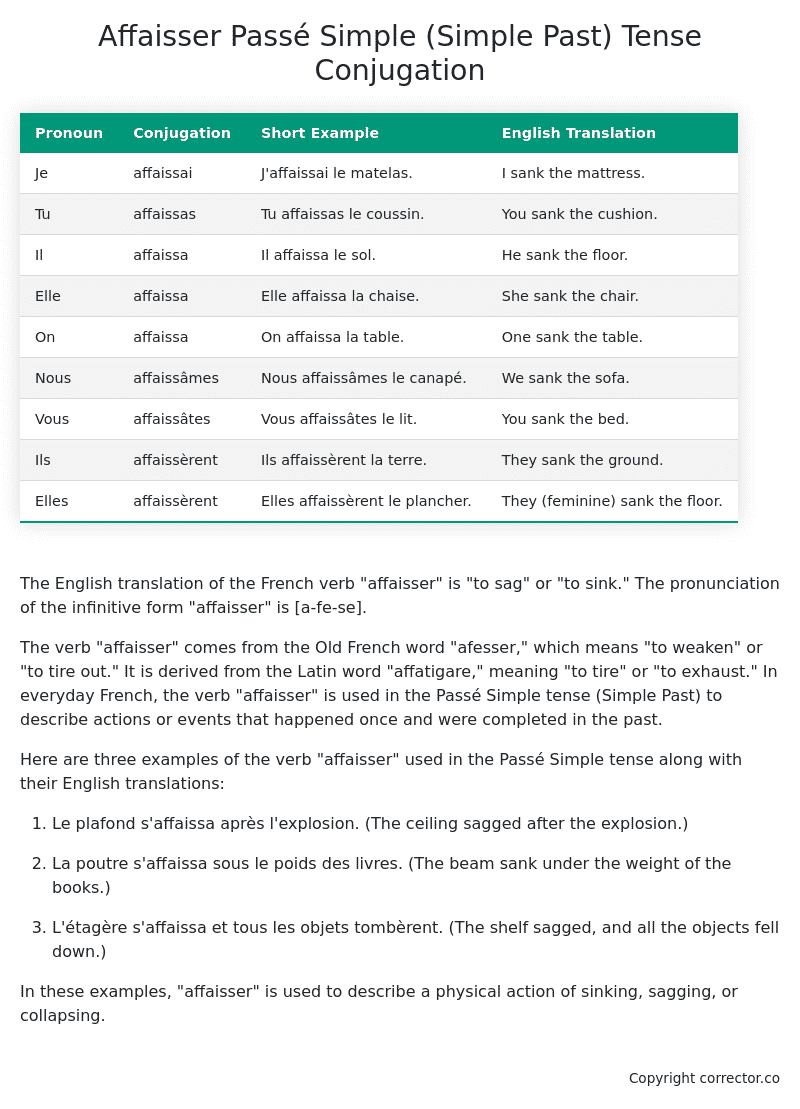Passé Simple (Simple Past) Tense Conjugation of the French Verb affaisser
Introduction to the verb affaisser
The English translation of the French verb “affaisser” is “to sag” or “to sink.” The pronunciation of the infinitive form “affaisser” is [a-fe-se].
The verb “affaisser” comes from the Old French word “afesser,” which means “to weaken” or “to tire out.” It is derived from the Latin word “affatigare,” meaning “to tire” or “to exhaust.” In everyday French, the verb “affaisser” is used in the Passé Simple tense (Simple Past) to describe actions or events that happened once and were completed in the past.
Here are three examples of the verb “affaisser” used in the Passé Simple tense along with their English translations:
-
Le plafond s’affaissa après l’explosion.
(The ceiling sagged after the explosion.) -
La poutre s’affaissa sous le poids des livres.
(The beam sank under the weight of the books.) -
L’étagère s’affaissa et tous les objets tombèrent.
(The shelf sagged, and all the objects fell down.)
In these examples, “affaisser” is used to describe a physical action of sinking, sagging, or collapsing.
Table of the Passé Simple (Simple Past) Tense Conjugation of affaisser
| Pronoun | Conjugation | Short Example | English Translation |
|---|---|---|---|
| Je | affaissai | J’affaissai le matelas. | I sank the mattress. |
| Tu | affaissas | Tu affaissas le coussin. | You sank the cushion. |
| Il | affaissa | Il affaissa le sol. | He sank the floor. |
| Elle | affaissa | Elle affaissa la chaise. | She sank the chair. |
| On | affaissa | On affaissa la table. | One sank the table. |
| Nous | affaissâmes | Nous affaissâmes le canapé. | We sank the sofa. |
| Vous | affaissâtes | Vous affaissâtes le lit. | You sank the bed. |
| Ils | affaissèrent | Ils affaissèrent la terre. | They sank the ground. |
| Elles | affaissèrent | Elles affaissèrent le plancher. | They (feminine) sank the floor. |
Other Conjugations for Affaisser.
Le Present (Present Tense) Conjugation of the French Verb affaisser
Imparfait (Imperfect) Tense Conjugation of the French Verb affaisser
Passé Simple (Simple Past) Tense Conjugation of the French Verb affaisser (You’re reading it right now!)
Passé Composé (Present Perfect) Tense Conjugation of the French Verb affaisser
Futur Simple (Simple Future) Tense Conjugation of the French Verb affaisser
Futur Proche (Near Future) Tense Conjugation of the French Verb affaisser
Plus-que-parfait (Pluperfect) Tense Conjugation of the French Verb affaisser
Passé Antérieur (Past Anterior) Tense Conjugation of the French Verb affaisser
Futur Antérieur (Future Anterior) Tense Conjugation of the French Verb affaisser
Subjonctif Présent (Subjunctive Present) Tense Conjugation of the French Verb affaisser
Subjonctif Passé (Subjunctive Past) Tense Conjugation of the French Verb affaisser
Subjonctif Imparfait (Subjunctive Imperfect) Tense Conjugation of the French Verb affaisser
Subjonctif Plus-que-parfait (Subjunctive Pluperfect) Tense Conjugation of the French Verb affaisser
Conditionnel Présent (Conditional Present) Tense Conjugation of the French Verb affaisser
Conditionnel Passé (Conditional Past) Tense Conjugation of the French Verb affaisser
Conditionnel Passé II (Conditional Past II) Tense Conjugation of the French Verb affaisser
L’impératif Présent (Imperative Present) Tense Conjugation of the French Verb affaisser
L’impératif Passé (Imperative Past) Tense Conjugation of the French Verb affaisser
L’infinitif Présent (Infinitive Present) Tense Conjugation of the French Verb affaisser
L’infinitif Passé (Infinitive Past) Tense Conjugation of the French Verb affaisser
Le Participe Présent (Present Participle) Tense Conjugation of the French Verb affaisser
Le Participe Passé (Past Participle) Tense Conjugation of the French Verb affaisser
Struggling with French verbs or the language in general? Why not use our free French Grammar Checker – no registration required!
Get a FREE Download Study Sheet of this Conjugation 🔥
Simply right click the image below, click “save image” and get your free reference for the affaisser Passé Simple tense conjugation!

Affaisser – About the French Passé Simple (Simple Past) Tense
Formation
Usage
Narration
Historical Context
Interactions with other tenses
Passé Composé
Imparfait
Conditional and Subjunctive
Summary
I hope you enjoyed this article on the verb affaisser. Still in a learning mood? Check out another TOTALLY random French verb conjugation!


